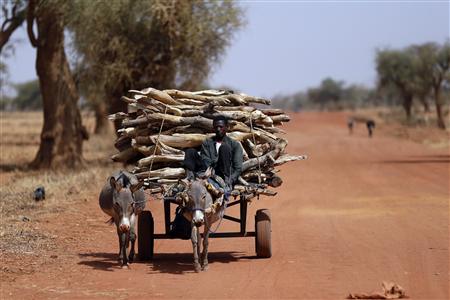
After driving the Islamists
from north Mali's main towns with three weeks of air strikes and a
lightning ground advance, France is now pursuing them in the remote
northeast where pro-autonomy Tuaregs are pressing their own territorial
claims.
French Defense Minister Jean-Yves Le Drian said French
and Malian joint patrols were searching the scrubland outside the desert
trading towns of Timbuktu and Gao. Gao residents said on Tuesday the
town was hit by rebel rockets fired from the bush.
"There were clashes
yesterday at Gao because from the moment where our forces, supported by
the Malian forces, started undertaking missions and patrols around the
towns we had taken, we encountered Jihadist groups that fought," Le
Drian told Europe 1 radio.
"It's a real war,"
Le Drian said. "Every night now, even last night, the French forces are
targeting and hitting the training centers and truck depots of the
jihadist groups."
With just 4,000 ground troops in an area the size of
Texas, France has appealed for the swift deployment of a U.N.-backed
African military force (AFISMA) to help secure the region, but this has
been slowed by lack of transport and equipment.Paris has said it would start to draw down its own force in Mali from March.
French troops are cooperating with Tuareg pro-autonomy MNLA
rebels who say they have occupied the remote northeastern town of Kidal
and surrounding areas after the Islamist fighters fled French air
strikes into the nearby Adrar des Ifoghas mountains.
The Tuaregs promised to help fight al Qaeda and its allies.That on-ground cooperation, and France's public insistence that the MNLA should take part in negotiations on Mali's political future if it drops its demands for full independence for the north, is an irritant for Mali's troubled military.
Mali's armed forces are still smarting from their defeat in last year's northern Tuareg rebellion that triggered a coup in the capital Bamako and was later hijacked by Islamist jihadists.
Interim President Dioncounda Traore has offered talks to the MNLA if they do not seek full independence, and says he is aiming to hold national elections in the country by July 31.
"There will never, ever be a solution if you don't talk to the Tuaregs - but they are not homogenous," said Jeremy Keenan, a British anthropologist and expert on the Tuaregs.
"The MNLA is trying to give the picture that they are back in control and that they are the legitimate voice... This is their last-chance saloon," he told Reuters, adding Mali's Tuareg community was comprised of many shifting factions and loyalties.
France has said that several hundred Islamist fighters have been killed in its Operation Serval in Mali since it intervened dramatically on January 11 to turn back an Islamist column advancing southward toward the riverside capital Bamako.
The loose Islamist alliance that had occupied the north for 10 months groups al Qaeda's North African wing AQIM, a splinter group MUJWA and Mali's Ansar Dine movement, led by a former prominent Tuareg separatist turned Islamist Iyad Ag Ghaly.
TUAREGS POSITIONING FOR TALKS
France wants to restore stability to Mali and remove the threat of Islamists using it as a base to launch attacks in Africa and the West. The United States and European allies are supporting the mission with transport, logistics and surveillance but have said they will not furnish combat troops.
Paris argues a lasting peace in Mali hinges on political talks to reconcile the black African-dominated government in Bamako with the restive north, in particular the Tuaregs.
Positioning itself
for talks, the MNLA said on Tuesday it had occupied the town of Menaka,
more than 250 km (185 miles) south from its remote northern stronghold
of Kidal.
But complicating
the chances of any deal is the deep resentment felt by many Malians
towards the MNLA for opening the door to the Islamists' seizure of the
north. The MNLA themselves are poorly organized, divided and represent
only a part of the north's population, experts say.
"You have a huge
part of the rest of Mali not wanting to have anything to do with the
Tuaregs - the Tuareg problem has to be resolved and it goes wider than
Mali," Keenan said. There are restive Tuareg communities in neighboring
Algeria and Niger.
Analysts said
Algeria and Mali's other northern neighbors such as Mauritania and Libya
must be part of international efforts to forge long-term security in
the ungoverned wastes of the Sahara, where al Qaeda hostage-takers have
sheltered alongside traffickers of drugs, cigarettes and migrants.
The MNLA has
started its own patrols in the remote regions around the Algerian border
where Islamist fighters are believed to be holding seven French
citizens hostage. It announced this week it had arrested two senior
Islamists fleeing to Algeria.
French special
forces and some 1,800 Chadian troops are also based in Kidal, but Malian
government troops have kept away.
"(The African
force) AFISMA and also the Malian army will deploy eventually to Kidal,"
AFISMA spokesman Col. Yao Adjoumani told a news conference in Bamako.
"Talks between the MNLA and the government will take place later."

No comments:
Post a Comment